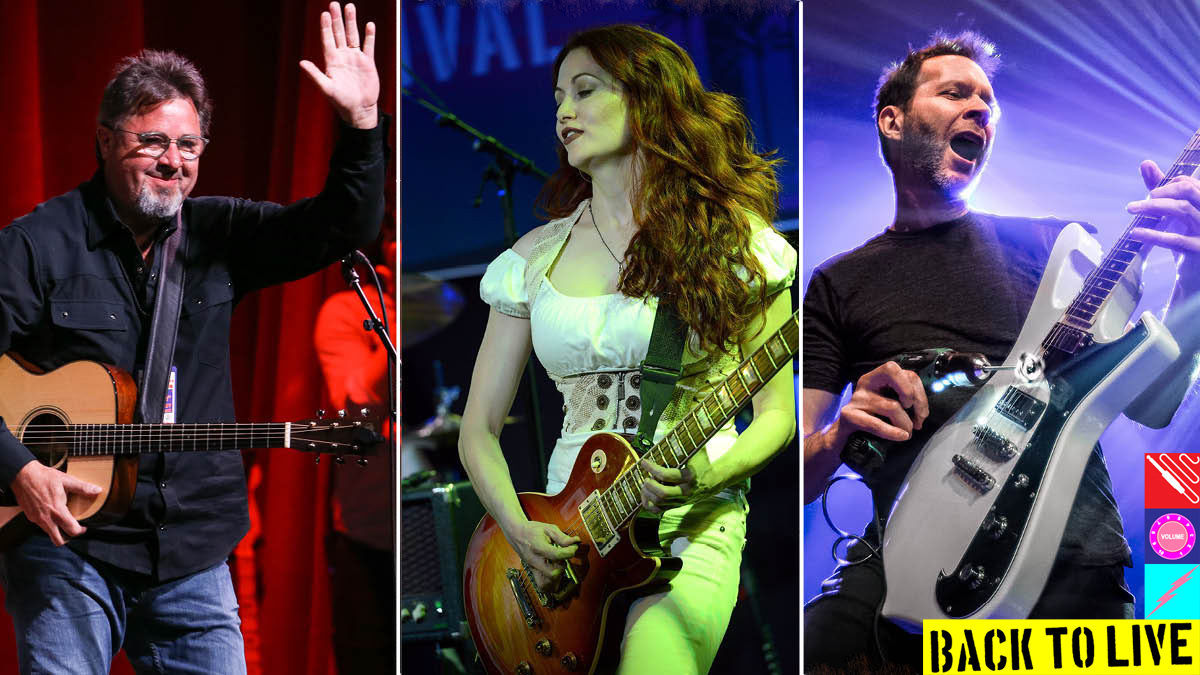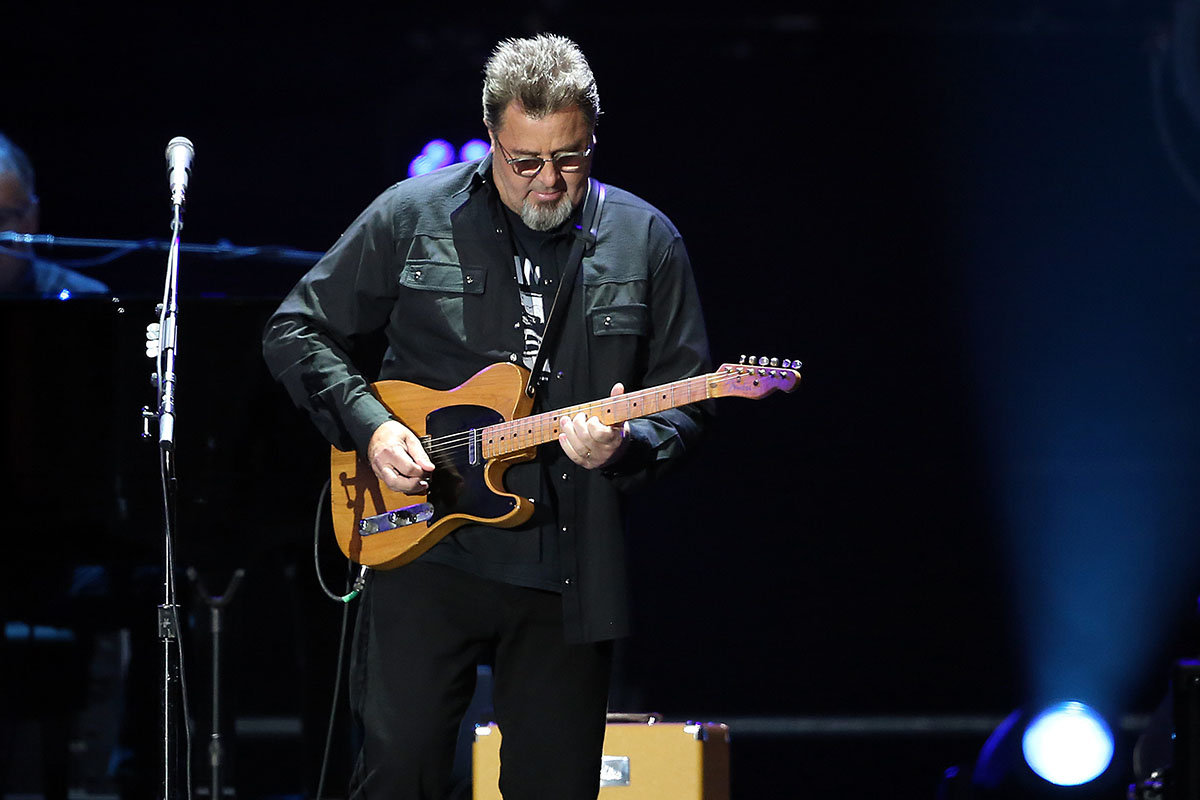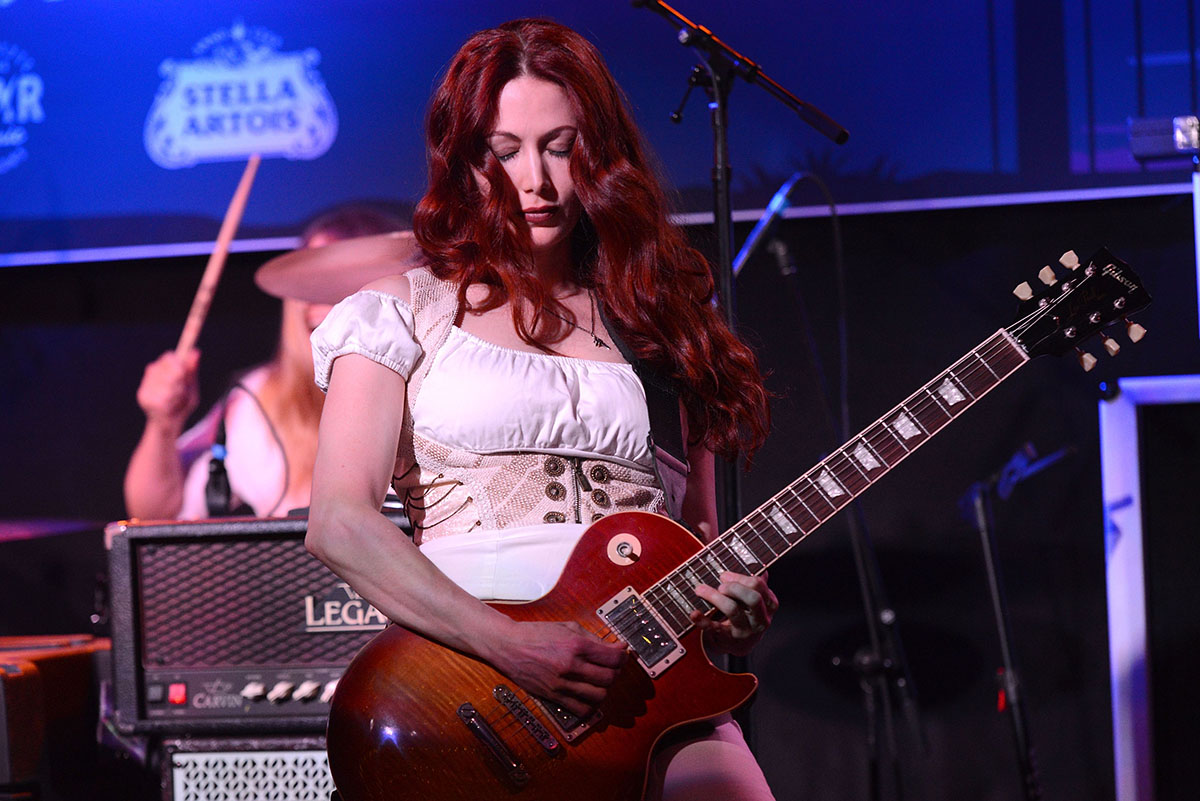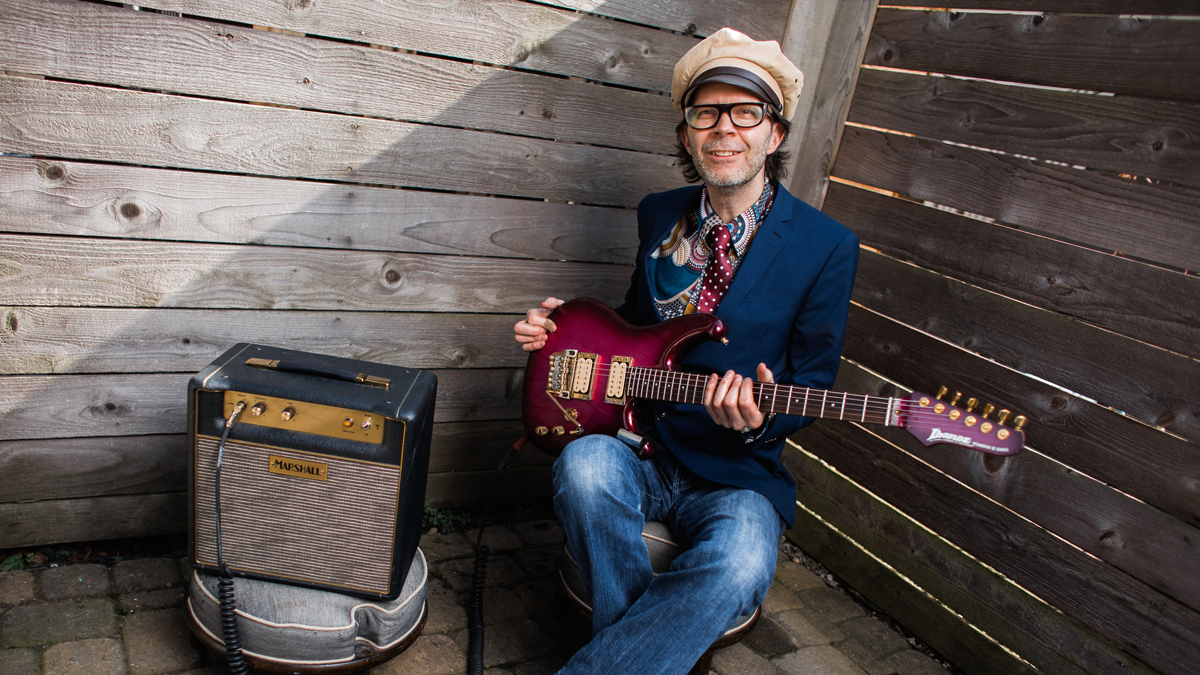
BACK TO LIVE: Late winter of 2020 proved to be the great equalizer in the music business. For artists everywhere, whether they were weekend warriors playing in bar bands, name acts packing large clubs or mid-sized concert halls, or superstars plotting stadium treks across the globe, the initial impact of the COVID-19 pandemic brought with it the same sobering message: the show won’t, in fact, go on.
One by one, itineraries were scuttled, music festivals were called off, and by the first weeks of spring the curtain came down on the entire concert industry.
“I think it’s an understatement to say it’s been a tough year,” says Eagles guitarist and country music star Vince Gill. “It’s been hard on people throughout the music business. A lot of people are hurting and struggling. On a personal level, I lost my best friend, Benny Garcia, who was also my guitar tech. He was my first music friend; we came up together and he’s taken care of me on the road for 30 years. Losing him was brutal.”
Gill notes that the forced work stoppage has been the first time he hasn’t played live on a consistent basis since he was a teenager. “It’s a mind-bender to be off the road,” he says. “From the day I started doing this, I’ve been clubbing, playing, touring – in whatever capacity I’ve been involved with, I’ve never stopped. So to go from 100 mph to zero has been strange.”
For Paul Gilbert, who was forced to cancel solo shows and his 2020 Great Guitar Escape, one of the toughest aspects of the pandemic has been the loss of a direct connection to fans during concerts.
“I definitely miss the energy of human beings in the same room, where we all have big grins on our faces,” he says. “Those magical moments of improvisation where I play better than I thought I could, they’re all because somebody is there to hear it.”
Gretchen Menn, guitarist for the all-female Led Zeppelin tribute band Zepparella, saw her band’s gigs grind to a halt. Echoing Gilbert’s sentiments, she says, “I miss playing shows. There is so much beauty in the unpredictability of live situations. The possibilities for inspiration and enrichment are everywhere.”
Get The Pick Newsletter
All the latest guitar news, interviews, lessons, reviews, deals and more, direct to your inbox!
There’s reason for optimism, however. With a host of vaccines now readily available and lockdown restrictions loosening, there’s widespread hope that large-scale concerts in the U.S. could return as early as midsummer.
Although Gilbert hasn’t scheduled any live dates as of this writing, his Great Guitar Escape: Shrapnel and Beyond is happening in July, and Zepparella have added some August and September shows to their calendar. Similarly, the Eagles are returning to the stage in August. “I’m excited to get back to it,” says Gill, who adds with a laugh, “but in a funny kind of way I’m also apprehensive – I know how rusty I’ll be!”

You’ve all mentioned what you miss about playing live, but there must be things you don’t miss about touring.
PAUL GILBERT: “I don’t miss airports, airplanes, buses, vans, hotels, trying to find healthy food and getting my laundry done. Those things can make you grouchy after a few decades. Sleeping in my own bed for nearly a year is something I don’t take for granted. It’s kind of spectacular.“
GRETCHEN MENN: “I don’t miss sketchy hotels with malfunctioning AC, delayed flights, crack-of-dawn call times. I don’t miss filthy or non-existent dressing rooms, and I’d be fine never again having to work with a sound engineer with a terrible attitude. But those are also the aspects of touring that build character and keep you flexible. They help you work on your patience.“
VINCE GILL: “Time away from home is never easy. It’s a trade-off. If you’re a musician, you love what you do. But time home is time home, and nothing feels better than that.“
My online guitar school has really taken off. I used to be able to keep up with my students’ video exchanges by doing an average of three videos per day. That has doubled
Paul Gilbert
What’s been the biggest adjustment for you during COVID?
GILL: “The whole thing has been an adjustment. While it’s great to be home, there’s elements of the performing life you can’t get anywhere else. You certainly can’t get them sitting in front of the damn television. I’ve watched every episode of Two and a Half Men over the last year and a half. On the other hand, my golf game is a lot better than it used to be. [Laughs]
GILBERT: “My year was looking impossibly busy, and my life has been impossibly busy for years, so I decided it was a good time to put some projects on hold and just focus on my online school. It gave me a chance to catch up with my family, as well. I have a young son, so I’m happy to spend more time with him. My online guitar school has really taken off. I used to be able to keep up with my students’ video exchanges by doing an average of three videos per day. That has doubled. I’m glad to have musical interaction every day.“
MENN: “The biggest adjustment has been spending so much time in the same place. It’s lovely to be home, but it’s also weird. This is the highest number of consecutive nights I’ve spent in the same bed since I was four.

Where were you when you got word that you had to cancel touring plans?
GILBERT: “I was home, getting ready for a lot of different projects. I put everything on hold and started to make a lot of pancakes and fresh orange juice.“
MENN: “I was at home, learning material and getting ready for upcoming shows – both with Zepparella and a corporate gig.“
GILL: “The Eagles had just played in Houston, and we were set to play Dallas three days later. I had come home from Houston and that’s when I heard that we’d be down for the spring. The general assumption was that we could rebook everything for the fall of 2020, but a month and a half later everybody said, 'No, this year’s toast.' So it went from a few months to six months to… whenever.“
I think some form of 'When are you going to be playing live?' is the most common question I’ve been asked over these past months
Gretchen Menn
When you realized touring was off for the foreseeable future, did you immediately set a new musical agenda for yourself – livestreams, remote recording, that kind of thing?
GILL: “I’ve done a bit of it. Everybody was kind of jonesing for anything that felt like someone playing live, even if it was just over your iPhone and you posted it some-where. I did quite a few of those for charity. And I’ve also played at the Grand Ole Opry.
“For 95 years, they’ve had continuous performances on Saturday nights, so I was honored to keep that tradition alive. There was me, Marty Stuart and Brad Paisley very far apart on acoustic guitars, with nobody in the house – we played for the radio show. It was kind of weird to finish a song and not hear any applause; it kind of reminded me of the old days.
GILBERT: “I did a bunch of shows on StageIt. It took some research to get the technical stuff together. I had to figure out the OBS app, how to configure multiple cameras, how to dial in the lighting and sound, and how to press the right buttons at the right time. After several shows I started getting a handle on it.
“Oh, yeah, and I had to play guitar, sing the songs, stomp on my kick drum box with my left foot and memorize a couple of 35-song medleys. But it was a good way to perform music, and I enjoyed it a lot. I’d like to do more StageIt shows, but I took a break to work on my new album.“
MENN: “The music industry is multifaceted enough that live shows, as important as they are, are only one component. Livestreams started happening almost immediately, and collaborations, remote recordings, demos and providing educational materials have helped fill in the financial cracks.
“Restrictions can often force creative solutions, and this has been an opportunity to explore other areas of music more deeply. Jennifer Batten contacted me a few months into the lockdown with her idea for an online guitar camp, the Guitar Cloud Symposium.
“The first installment was in August 2020 with Jennifer, Nili Brosh, Vicki Genfan and me. It’s been steadily growing, with guitarists like Angela Petrilli, Daniele Gottardo, Jude Gold, Mark Lettieri and others coming aboard to teach.“
Have these big blocks of free time given you a chance to explore new aspects of your own music that you couldn’t if you were on the road?
GILL: “Sure. There’s two ways to go about life: with a positive spin or a negative spin, and a negative spin doesn’t do anybody any good. I’ve kept myself busy in the studio, and I’ve done some work on a bunch of people’s records. I could claim that I haven’t really done anything in a year and a half, but that’s not the case. I’m always grabbing a guitar when I see one in a room. I’m writing a few songs here and there.“
MENN: “I made a commitment at the beginning of all this to use the time in a way that my future self would appreciate. So I’ve been working on growing as a musician, focusing on weak or underdeveloped areas of my playing, composing another solo album, reading more books. Not only do I want to be a better musician, but I also want to be a better human.“
GILBERT: “I did some rethinking about how to make my new album. My original plan was to record with a band live in the studio, but since the lockdown I decided to try playing all the instruments myself. I’ve always loved playing drums, and I had the best time in the world bashing away with a pair of sticks. The album is called Werewolves of Portland, and it came out really great.“

Without live shows, it seems as if people are paying more attention to artists’ recordings. Do you think this renewed interest in recorded work will last?
GILL: “It’s interesting. People aren’t buying records per se anymore. Streaming services are good, but they’re inadequate in terms of what you can make. That stuff is evolving, and I think it’ll get better. But for the past few years, live shows are where we make money, and that’s why people have been playing live so much. Because of that, recorded work took a back seat. Will things flip around? I don’t know. If I could foresee the future, I’d be doing a lot better than I am. [Laughs]“
The estimates are that artists can return to touring at some point this year. Is that what you’re hearing?
GILBERT: “I’ve got my guitar camp, The Great Guitar Escape, scheduled for July. I’m aiming at that – optimistically.
MENN: “I’ve heard all sorts of estimations, and at this point I’m not even trying to guess. I’m confident that humans will roll with whatever happens and make the best of it. If 2020 has taught us anything, it’s that we’re adaptable and resilient creatures.“
GILL: “The hard thing about touring is how long it takes to set it up. You can’t just announce, 'Hey, I’m going to be in Moline in two weeks.' You’ve got to plan six, nine months in advance, and the way things are going, nobody can put a timeline on when it’s really going to be OK to work. You might think it’s this year, but Broadway isn’t opening up till spring of 2022. The same fate might be for us, but I think most people are assuming fall.“
Have you given thought as to how you’d like to tour again? Some artists have played drive-in shows the past year.
MENN: “I’ll be happy when we can rehearse again. [Laughs] I think the most likely case is we’ll start with our favorite local venues and branch out from there.“
GILBERT: “It’ll be difficult for a show to be stranger than the guitar clinics I’ve done in Chinese discotheques. I’m ready for anything.“
Vince, your situation is different. You have your solo career but you’re also part of the Eagles.
GILL: “Yeah, it’s a unique situation. When the Eagles dates got rescheduled last year for the fall of 2021, anything I would do solo-wise would obviously be around that. I can’t fathom anything happening before that. So I don’t look at the calendar and go, 'Hey, I could go out this summer.' That feels unrealistic. Solo-wise, it’s probably 2022. I’ve always tried to make the best use of my time when I knew I didn’t have an Eagles date. I’d go out and do some dates on my own.“
At first, venues might be required to operate at less-than-half capacity. As a performer who’s used to full houses, is that going to be tough?
MENN: “I imagine I’ll be so elated to be on stage with my bandmates that I’ll be grateful for anyone who is there to share the experience with us.“
GILBERT: “[Laughs] Empty seats strike fear in the heart of any performer, but I’ve played casino showrooms where all the seats are big, wide booths. People were spread out, and we all still rocked just fine.“
My guitar music will be filled with emotion, but it’ll still be complex enough to keep people from bouncing into each other
Paul Gilbert
GILL: “For me, the mind-bender is the economics. I mean, if you’re playing the Ryman, and that’s a 2,200-seat hall, the first 1,800 people are the break-even people. It’s the next core 500 seats where everybody makes a little bit of money. The math gets simple. The price of diesel fuel doesn’t go in half just because 40 percent of the people came to the shows. So it’s going to be hard to see it have a chance to work, financially, at that mindset. It’ll be interesting to watch. Now, I do think things will come back, but it might not be all at once.“
What are you hearing from fans? Are they ready to be at your gigs whenever it’s safe to come out again?
MENN: “It sure seems so. I think some form of 'When are you going to be playing live?' is the most common question I’ve been asked over these past months.“
GILBERT: “I’ve heard from people who miss going to live shows. I’m fortunate to have an audience that comes for the music instead of a wild drinking party, so I think people will have their wits about them, and they’ll use caution when necessary. I’ll plan carefully before I add any George Thorogood songs to the set. [Laughs]
“I actually love George Thorogood. But that might get the place going a little too crazy. My guitar music will be filled with emotion, but it’ll still be complex enough to keep people from bouncing into each other.“
GILL: “I think the fans will be more than ready. People are hoping to get back to all the aspects of their lives, and that includes live music. That’s a good incentive for me. There have been times lately that I’ve noticed a little bit of a slowdown in my hands. I’ll go, 'I’m not quite up to speed with what my brain is telling me.'
“Putting in the work will be fun, though. There’s nothing like repetition that creates what you need. In the grand scheme, it might make us all play a little bit less, which would be much more palatable. [Laughs]“
Joe is a freelance journalist who has, over the past few decades, interviewed hundreds of guitarists for Guitar World, Guitar Player, MusicRadar and Classic Rock. He is also a former editor of Guitar World, contributing writer for Guitar Aficionado and VP of A&R for Island Records. He’s an enthusiastic guitarist, but he’s nowhere near the likes of the people he interviews. Surprisingly, his skills are more suited to the drums. If you need a drummer for your Beatles tribute band, look him up.
“The nuisance is exacerbated by the repetition and poor quality of some of the performances”: Buskers banned from London’s Leicester Square as performances likened to “psychological torture”
“It went wrong since Corona”: Bax Music, one of Europe’s largest musical instrument retailers, files for bankruptcy and ceases operations


![A black-and-white action shot of Sergeant Thunderhoof perform live: [from left] Mark Sayer, Dan Flitcroft, Jim Camp and Josh Gallop](https://cdn.mos.cms.futurecdn.net/am3UhJbsxAE239XRRZ8zC8.jpg)







